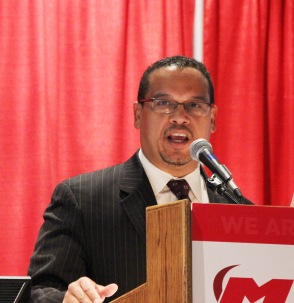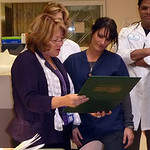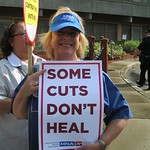In a week in which we marked the 50th anniversary of the historic 1963 March on Washington, Labor Day this year comes at a good time to reflect on the broader vision of what it means to be a registered nurse, a union member and a working class American.
The hundreds of thousands who traveled many miles to Washington half a century ago, marched and rallied for racial justice, freedom, and equality.
But as many have pointed out, economic justice and jobs were also a foremost subtext to that day, as represented by many union participants and, of course, Dr. King himself who five years later would literally give his life speaking out for workers.
In 1963, labor was at its apex of strength, as evidenced just two years later with enactment of another signature reform in America, Medicare and Medicaid, the direct result of a campaign led by unions and active and retired union members.
Participation in the March on Washington, and tireless advocacy for guaranteed healthcare for retirees, the disabled, and the most poor in America, reflect the principles and activism that were so essential to the growth of a labor movement in this nation. An activism that sees commitment to justice, equality, and human rights for everyone as central to the core vision of what it means to be a union.
Five decades later we’ve made significant progress on many goals of that 1963 movement. But in many ways, we are, as a nation, shockingly worse off. Income equality and the concentration of wealth in the hands of the 1 percent is as disparate as at any time in our history. Today’s children are the first generation in decades who can fear they will have a worse standard of living than their parents and grandparents.
Consider some statistics just from the last week:
- From 2005 to 2011, we’ve seen a 15 percent decline in homeownership among households with children and a 33 percent increase in households where at least one parent was unemployed. The number of households with an unemployed parent jumped 148 percent in Nevada and by more than 50 percent in California, Colorado, Connecticut, Florida, Hawaii, New Jersey and North Carolina.
- Since the financial crisis of 2007, median household income is down 6.1 percent – or $3,400.
- The federal minimum wage of $7.25 per hour has not been raised since 2009, and number of workers living off that (or less) more than doubled between 2007 and 2012.
- One of the biggest boom sectors is pawn shops. While big banks focus on limiting lending to the most affluent, more pawn shops are operating as financial service institutions to those who have no other option for help, while charging interest rates of up to 25 percent. The number of pawn shops has nearly doubled in the past six years. http://dealbook.nytimes.com/2013/08/24/platinum-card-and-text-alert-via-pawnshop/?ref=todayspaper&_r=0&pagewanted=print
- At the other end, times have never been better, especially for those on Wall Street who created the latest round of suffering on Main Street. The banking industry just recorded their biggest earnings ever, $42.2 billion in profits just in the second quarter of this year. And the nation’s banks are handing out more in compensation and bonuses than ever. http://www.huffingtonpost.com/2013/08/29/bank-profits_n_3837053.html
As nurses know best of all, the disparities are especially evident in perhaps the most significant barometer of our nation, healthcare.
While the U.S. spends more on healthcare than anyone else, we have one of the highest morality rate among infants and children and the lowest adult life expectancy rates among all developed nations.
If there’s one news story that should have jumped off the pages this week, it is the story of a 50-year-old Oregon man who robbed a Portland bank August 23, demanding $1. He then sat down and waited calmly for the police to arrest him. The reason – he needed medical care, and felt prison was the only place he would be able to get care.
Two years ago, NNU launched a campaign for a Main Street Contract for the American People, premised on the notion that in a just, humane society, we need to assure everyone can have high quality medical care not based on ability to pay.
Our campaign also calls for jobs at living wages, equal access to quality public education, a secure retirement with the ability to retire in dignity, secure housing and freedom from hunger and homelessness, and a safe and clean environment.
We also have a proposal how to pay for a more equitable nation, the Robin Hood tax on Wall Street speculation.
This Labor Day, honor the best tradition of labor by getting involved in our campaigns. Learn more about our Main Street campaign and about our campaign for the Robin Hood tax.
Happy Labor Day!
###





